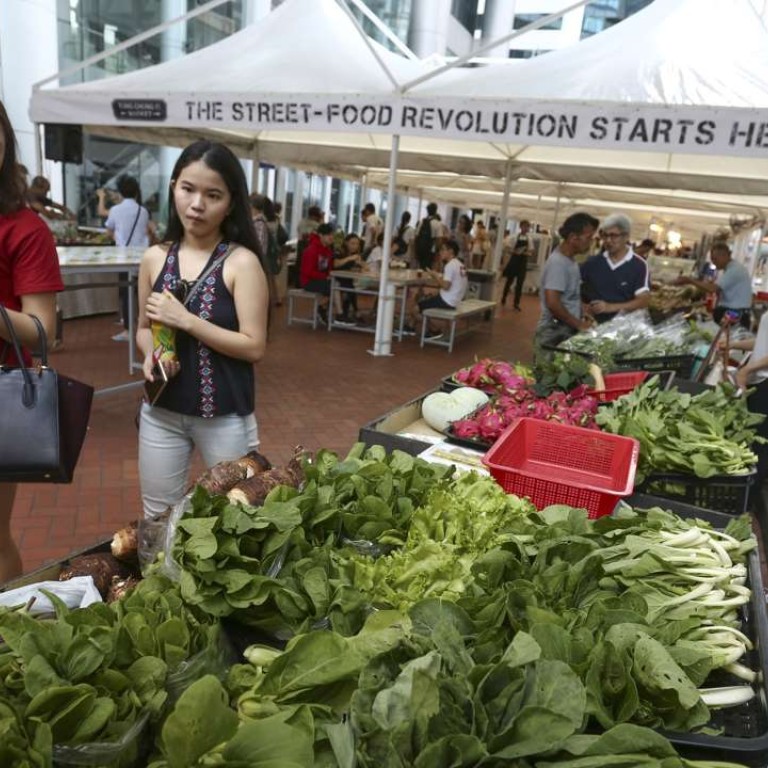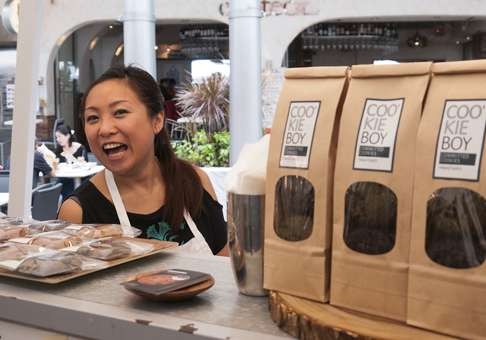
Hong Kong’s organic food start-ups turn to weekend open markets
With developers such as Swire and Hong Kong Resort International looking to attract visitors and local indie food vendors having trouble securing space to set up shop, both have benefited from weekend community markets
A small crowd waits eagerly to be served in front of a stall at Tong Chong Street Market in Quarry Bay, drawn by the aroma of freshly baked sourdough bread.
“You can call me a foodie, but really I just appreciate local, fresh and seasonal food,” says Alessio Savona, an osteopath who started visiting farmer’s markets when he lived in London and now checks out the fare at Tong Chong Street most Sundays.

Sometimes dismissed by cynics as little more than window dressing for expatriate neighbourhoods, or a middle-class fad, community street markets are playing an increasingly important role in Hong Kong’s local economy.
“These vendors are mostly start-ups, so we can help them to be potential future tenants. We want Taikoo Place to be more than just an office development,” says Emily Wu, assistant marketing manager of Swire Properties, which organises the market in partnership with Honestly Green, a venture that aims to connect consumers and sustainable food producers.
“This market creates the ideal platform to test new products and create a new brand. We all work in hotels from Monday to Friday, but our dream is to make this our full-time occupation. Hong Kong is too expensive for retail space,” says Cherry Tsu, co-founder of Cookieboy cookies.
It can’t do Swire Properties’ public image any harm to be associated with small business start-ups and eco lifestyles, and it is not the only large-scale private landlord to see the attraction of an artisan-style market enhancing the company’s real estate with some diversity and colour, and bringing in crowds.

“HKRI came to us after our involvement in the SoHo Wine and Dine Festival in 2009 because they wanted to attract more people to Discovery Bay. They were really open to our ideas,” says Olinger Sweeting. It has quickly grown into a regular Sunday market with up to 150 tables in peak months, with vendors selling home-made goods, speciality imports and gourmet food.

Prices at Discovery Bay start at about HK$350 per day to a high end of about HK$1,400, which is comparable to Tong Chong Street, where local organic farmers are offered a discounted rate of HK$200 per day.
“It’s part of the reason we extended our values to include small business owners,” says Olinger Sweeting. She points to the importance of online sales and social media for new entrepreneurs trying to develop a new brand from scratch on the streets of Hong Kong.

At Sai Kung Market, held indoors at the Hong Kong Academy in Wai Man Road, organiser Greg Hunt provides an online sales platform for the approximately 400 vendors on his books to augment the popular monthly event. Hunt was originally looking for an outlet for his own gourmet food product. When he posted his idea on social media, he was so overwhelmed with enquiries that he set up a more general community market, which he curates and runs himself. The market is open year round, usually on the first Sunday of each month, with the exception of January and August.
“You can’t just pop over to Shenzhen and buy a bag of ‘old toot’ and expect to sell it here. This is very much about high-quality products and good organisation,” he says, enthusiastically listing some of his vendor’s products, which range from locally baked bagels and handmade silk bedding to traditional sausages and home-made chutneys.
“This is stuff you won’t see in Wellcome, and even if you did it would cost a small fortune,” Hunt says. Like the other organisers, he believes these markets are an essential platform for start-up businesses.

One of the success stories is chef Priscilla Soligo, founder and co-director of Raiz The Bar, a specialist organic chocolate company, who first rented a stall at a Hong Kong market in 2013.
“Markets are how we built the brand, got a following and developed our products,” she says from the chocolate factory she opened in Kwun Tong in March last year.
“Markets were integral to our business and catapulted our success in Hong Kong” says Soligo, who now supplies local five-star hotels and exports to Australia and Britain via a global distributor network.
Soligo adds that there is now a plethora of markets to choose from and many are linked to high-profile events. Olinger Sweeting and Hunt say there is no shortage of demand from potential vendors.

Olinger Sweeting says that although she has approached other private landlords, the location has to be right, and government-owned sites can be a bureaucratic headache to organise and overregulated.
Many local vendors complain about the bewildering levels of paperwork required to operate a simple market stall. According to the Food and Environmental Health Department’s website, a “temporary food factory licence” must be obtained for any stall selling pre-cooked food. Some vendors say the requirement for a coffee and bagel stall to be designated a “food factory” is ridiculous. Even if the paperwork is successfully navigated, the licence is only valid for seven days and the licensee is only allowed to sell food supplied by an official licensed food factory.
Put simply, if anyone bakes their bagels in their home kitchen, it’s illegal to sell them on the streets of Hong Kong.
Soligo and others say a recent crackdown by the department on food prepared at home threatens to stifle entrepreneurs and small businesses trying to make a start in the community markets.
With very few hawker licenses now being issued by the government, this new generation of community markets presents possibly the only viable platform to launch a new business idea and preserve the proud local tradition of street markets.
Organisers like Hunt think that while the typical demographic profile of his visitors tends to be professional and “internationally educated”, the street markets have a serious economic function. He thinks they represent much more than just a dash of colour in sterile high-rise developments or enhancements of expatriate neighbourhoods.
“Maybe it is a middle-class fad but how did Richard Branson start his Virgin business empire?” asks Hunt. “Selling second-hand records in markets.”

